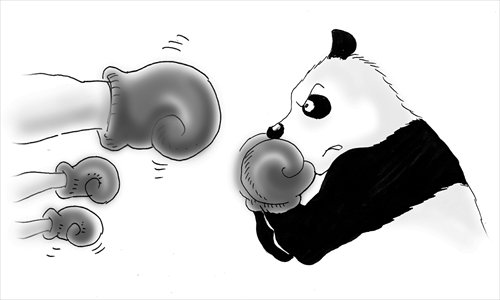


Illustration: Liu Rui/GT
Philippine President Benigno Aquino III will seek the congressional approval of the proposed national budget for 2016 next week. In the budget proposal, the defense budget is $552 million, less than one 200th of China's military spending for 2015. The size of the Philippine defense budget may surprise many Chinese.
The defense spending of Vietnam is much higher than that of the Philippines. It reached $4 billion in 2014, but is still incomparable to China's. The GDP of Vietnam is less than $200 billion, much less than that of China's Guangxi Zhuang Autonomous Region which borders Vietnam. This will definitely constrain its overall scale of defense budget.
Though judging from the military spending of the Philippines and Vietnam, we can perhaps understand that the two countries won't pose a serious military threat to China in the South China Sea. But they are very likely to make a fuss and lean to external actors to intrude China's sovereignty and interests in the South China Sea.
The Philippines, facing a China with expanding maritime strength, feels anxious. But it is still greedy in its territorial claims. It holds a complex and sensitive mentality toward China.
Propaganda that China bullies small South China Sea claimants can spread easily, especially when Washington and Tokyo meddle backstage. China needs to do a lot of work to convince people of historical facts such as the origin of the nine-dashed line and that China holds sovereignty over the Nansha Islands. However, it is much easier to frame China as attempting to exert "hegemony" in the South China Sea.
China has to deal with the Philippines and Vietnam with enough patience and at the same time respond to distorted interpretations from the US and Japan about China's reef-building. The troubles are mostly caused by Manila and Hanoi, while strategic pressure mainly comes from the US.
The US and Japan have teamed up with the Philippines. China is not only facing several vessels and coast guard ships of the Philippines. Rather, China has been striving to figure out how to deal with the above issues and its own stakes in such a complicated scenario.
Obviously, China does not want to bear such reputations as "bullying small countries" or "seeking hegemony in the South China Sea." An impression of a peacefully rising China fits the country's global strategy. But if the Philippines and Vietnam, instigated by the US and Japan, cause a nuisance and step over China's red line, China will not remain restrained.
The Philippines and Vietnam are well aware of this. With China's increasing capabilities in the South China Sea, they will behave more cautiously.
The rivalry in the South China Sea is a highly technical diplomatic game and strategic contest. The public opinion should lend support, and Chinese decision-makers must be specialized diplomatic and strategic institutions. The Chinese public needs to know the real pattern of strength in the South China Sea and acknowledge that China has ample room to maneuver over the Philippines and Vietnam.
The strategy of the Philippines is to whine to the world about China's "bullying" so as to hinder China's global strategy. Hence it has formed an accord with Washington and Tokyo.
China has succeeded in its land reclamation projects on the Nansha Islands. This is an outcome of China's diplomatic specialization. It is reasonable and legitimate. The US and the Philippines can do nothing about it despite voicing objections.
The South China Sea should be an area where Chinese society can find confidence after experiencing long-time sufferings and setbacks. A big country not only owns its strength, but also has a broad mindset and wisdom to count its losses and gains.
The article is an editorial of the Chinese edition of the Global Times Wednesday.
 Soldiers serving at Liaoning aircraft carrier
Soldiers serving at Liaoning aircraft carrier Bikini beauties lifeguards in river rafting place
Bikini beauties lifeguards in river rafting place PLA soldiers eat raw snake meat in harsh training
PLA soldiers eat raw snake meat in harsh training Doctors use 3D-printed skull to save girl
Doctors use 3D-printed skull to save girl Kiss contest held in Nanning, SW China
Kiss contest held in Nanning, SW China Yunnan-Myanmar Road: The past and present
Yunnan-Myanmar Road: The past and present Campus belle of Xiamen University gets popular online
Campus belle of Xiamen University gets popular online Who says moms cannot be trendy and hot?
Who says moms cannot be trendy and hot? Eight fruits that defend men's health
Eight fruits that defend men's health  Heart of china
Heart of china Export growth a positive sign: MOFCOM
Export growth a positive sign: MOFCOM BRICS chart new course in global finance
BRICS chart new course in global finance  Apeing the Monkey King: portraying Sun Wukong in TV, film and games
Apeing the Monkey King: portraying Sun Wukong in TV, film and games Day|Week